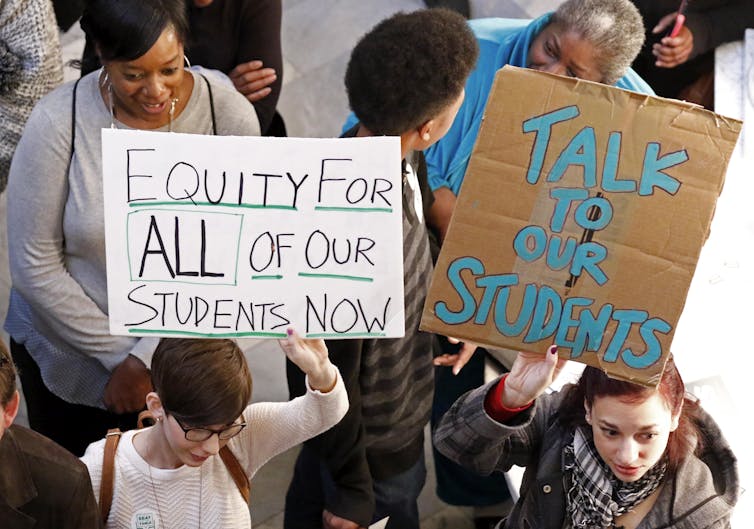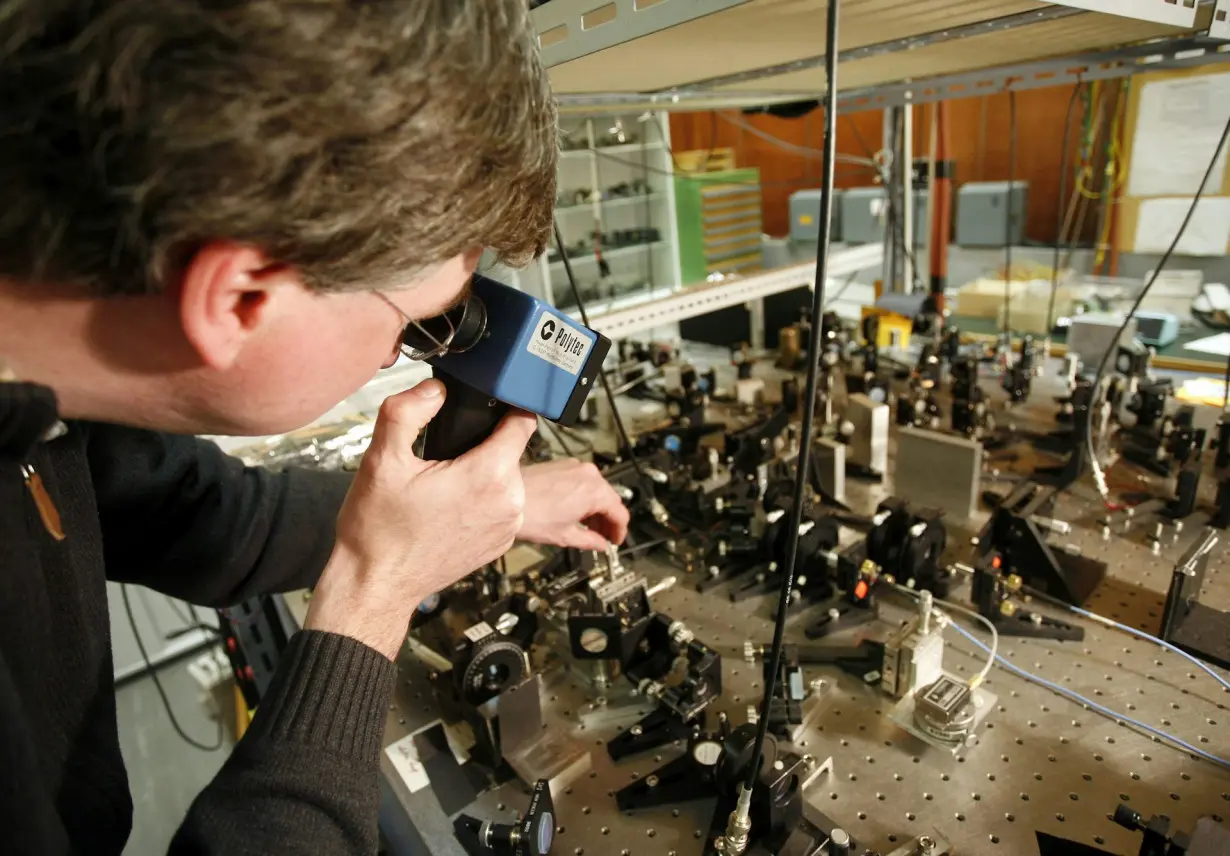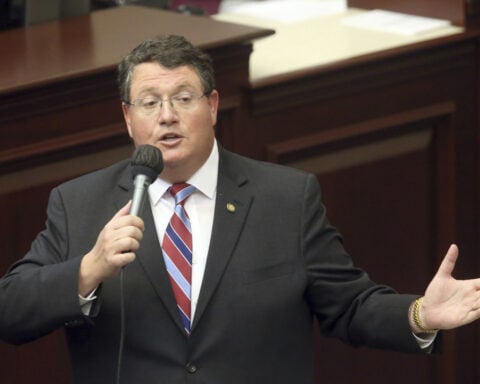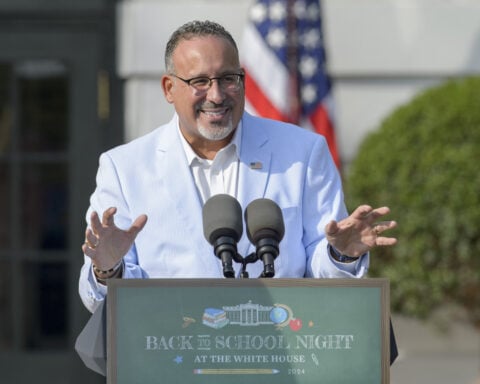Quantum information science uses the physics that describes the smallest particles – such as electrons or photons – to potentially revolutionize computing and related technologies. This new field can be used for a wide range of applications, from developing new devices to data encryption.
As the potential applications of quantum information science inch closer to reality, quantum information science courses in university and high school classrooms are expanding at a rapid pace.
We are a group of physics education researchers who study student performance in physics and how quantum information science is taught and learned.
Currently, we are looking into quantum information science education. One question we are asking: Who has access to a quantum information science education? And related: How might this affect who participates in the field?
New courses designed to introduce students to the basics of quantum information science are being developed at schools across the nation from the high school to graduate level. For example, the Quantum Systems through Entangled Science and Engineering Center in Colorado. It is unknown, however, whether these new programs are equally accessible to everyone.
Disparities in higher education
It is well known that not everyone has the privilege of going to college or university, due to inequities in access to resources such as well-funded education at the K-12 level, family financial support and people in their lives who can help them navigate this complex process. These inequities are even larger for the scientific fields where mentorship and preparation gaps can both discourage students from ever pursuing scientific careers and push out underprivileged students who try.
For example, introductory physics is required for most science majors in college and is well known to be challenging, fast paced and require a fair amount of math. Students with less than stellar math preparation in high school or who are first-generation college students may find these classes overwhelming and may not have anyone to turn to for help.
However, in the case of the emerging area of quantum information science education, scientists and educators now have a unique opportunity to address equity from the beginning. If education in this field can reach all students, it has the opportunity to disrupt some of the systemic inequities that currently plague our educational systems.

Nationwide quantum information science education
We investigated whether students from all backgrounds in the U.S. have equal access to quantum information science education. To do this, we collected information on the distribution of quantum information coursework at 456 institutions of higher learning as of fall 2022.
Our goal was to identify whether the type of institution, funding sources and geographic location were linked to how likely that institution was to offer courses in quantum information science. We found that these courses were more likely to be found at large, private universities with a significant research focus and located in heavily urbanized states – such as, for example, Colorado. In general, these large, research-focused universities are typically quite expensive to attend in a four-year degree program often necessary for quantum research or development.
Moreover, attending an urban school requires rural students to leave their homes, travel long distances and adjust to significant increases in the cost of living. Together, this suggests that existing quantum information science courses and programs are less likely to reach low-income and rural students.
Some might believe it is natural to find these cutting-edge courses at large, affluent institutions before they are offered at smaller institutions and those with fewer resources. As long as these programs continue to be accessible only to select students, however, there’s a risk of perpetuating a system in which the benefits of a science degree – such as access to a well-paying, secure job market – are not distributed evenly across social and economic groups.
Additionally, while new technologies bring many benefits, they also often bring about unexpected harms. Without the participation of people from all backgrounds, such harms may affect certain groups more than others.
Recommendations for equitable quantum education
We hope that our study prompts policymakers, educators and researchers to evaluate the accessibility of their quantum information science efforts.
Based on our findings, we recommend targeted investments toward building quantum information science education and research programs at predominantly undergraduate and rural institutions. Such efforts can build on the success of existing programs targeting quantum education at minority-serving institutions, such as the IBM-Historically Black Colleges and Universities Quantum Center.
Investment in rural education may be a promising opportunity that could generate bipartisan support.
We also urge the National Center for Education Statistics and similar organizations to collect and publish more comprehensive data on student enrollment in quantum information science degree and certificate programs. This will give policymakers the information they need to ensure the benefits of quantum information science are reaching all parts of the country.

Bethany Wilcox receives funding from the National Science Foundation.
Gina Passante receives funding from the National Science Foundation.
Josephine Meyer receives funding from the National Science Foundation. She is affiliated with the Quantum Ethics Project.
Source: The Conversation

 Germany's economy shrank for the second consecutive year in 2024
Germany's economy shrank for the second consecutive year in 2024
 Italy, Albania, UAE sign deal for energy subsea interconnection
Italy, Albania, UAE sign deal for energy subsea interconnection
 European shares advance as bond yields ease; soft inflation powers UK stocks
European shares advance as bond yields ease; soft inflation powers UK stocks
 Bayern Munich signs US youngster Bajung Darboe from LAFC
Bayern Munich signs US youngster Bajung Darboe from LAFC
 Novak Djokovic breaks a tie with Roger Federer for the most Grand Slam matches in tennis history
Novak Djokovic breaks a tie with Roger Federer for the most Grand Slam matches in tennis history
 China's RedNote: what you need to know about the app TikTok users are flocking to
China's RedNote: what you need to know about the app TikTok users are flocking to
 A research assistant at the the German National Metrology Institute studies an atomic clock.
A research assistant at the the German National Metrology Institute studies an atomic clock.







